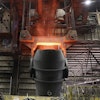American manufacturers faced $24.6 billion in pollution abatement costs last year, a total far higher than the amount in many competing nations, according to a recent analysis.
The country's manufacturing sector, however, landed in the middle of the pack when analysts compared those costs to overall manufacturing value added.
The Manufacturers Alliance for Productivity and Innovation Foundation study examined the price tag for waste disposal, wastewater treatment and air pollution and greenhouse gas abatement for the U.S. and eight of its largest trading partners.
The $24.6 billion U.S. total nearly doubled that of second-place Japan and nearly tripled that of third-place Germany. Canada, Korea, Brazil, France, the U.K. and Mexico each trailed the U.S. by more than $20 billion.
U.S. abatement costs, however, amounted to 1.2 percent of manufacturing value added. That matched Japan's percentage and fell just below those of Germany and Korea. Canadian manufacturers paid 2.2 percent of that country's manufacturing value added level, the highest among the nine nations; Mexico, at 0.8 percent, had the lowest percentage.
The report found U.S. manufacturers paid relatively more to reduce air pollution and comparatively less to treat waste and wastewater. Greenhouse gas abatement, meanwhile, cost far more in Europe.
MAPI Foundation analysts said that within the U.S., the petroleum refining industry accounted for 27 percent of greenhouse gas control costs and the food industry accounted for 28 percent of waste and wastewater treatment totals. The report argued U.S. steel and paper manufacturers paid disproportionately more for all types of pollution control.
"Our analysis shows that American manufacturers continue to bear a significant burden in environmental regulatory costs, especially when compared with their competitors in developing nations," said report author and MAPI chief economist Daniel Meckstroth. "Those nations that are air treatment or water treatment intensive have a relatively higher portion of the total cost."
The MAPI study, citing unreliable data, did not include China, which trails only Canada among U.S. trading partners.






















